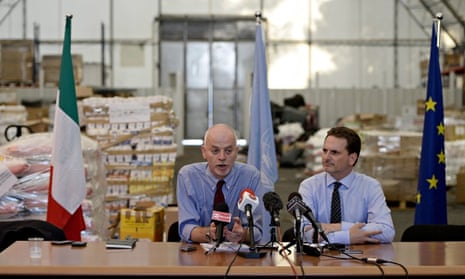After 20 years of debate, negotiations and setbacks, Italy is finally stepping up its efforts on international development. Last week the parliament approved a new law setting out an ambitious agenda for reform, including the creation of a development agency and financing facility, funded by Italians’ postal savings.
What to make of such long-awaited news? At first, one is tempted to sneer at Italy deciding to join the party when aid agencies are shutting down in other parts of the western world, such as Australia, and Canada, and when the Brics – Brazil, Russia, India, China and South Africa – are getting organised to finance south-south co-operation.
Italy has been lagging behind in all donor development indexes for many years and its performance on the international stage is often judged as inadequate at best, and poor in most cases. So at least this reform signals the Italian government’s intention to take itself more seriously when it comes to international relations, something that the government of prime minister Matteo Renzi recently displayed in relation to EU negotiations.
Much remains to be seen: a cynic may argue that, when it comes to Italy and political commitment, “Tra il dire e il fare c’e’ di mezzo il mare” (“In between saying and doing lies an ocean,” or “More easily said than done”). Yet I would argue that there is more to this measure than placing a bit of extra aid on the table.
These reforms are far from perfect. Some have already commented on the not so small problem of the finance ministry remaining fundamentally in control of the aid budget, while the foreign ministry leads on implementing development partnerships and setting priorities. Judging by many past cases, in the often murky and less than meritocratic Italian government, the creation of an agency may quickly turn into yet another opportunity to dish out favours and poltrone (literally armchairs, but used to mean good jobs). Finally, the reform text (pdf) suggests that this new national aid system will live side by side with the existing decentralised structure, with the regional government still in charge of elements of the reform, which could risks making policy incoherent.
Yet, despite these challenges, I am optimistic. Italy is obsessed with its own domestic issues and the declining quality of national political debate. From this perspective aid reform may help to stimulate public interest in global affairs – including those that touch Italy more directly, such as migration.
I look forward to seeing global issues and challenges feature more prominently in Italian politics. There is no doubt that this will soon turn to arguments about whether Italian taxpayers’ hard-earned money – at times of such austerity – should be spent resolving foreign problems.
In Italy, the aid debate is still relatively uncharted territory, unlike in many other countries, including the UK and the US, where the political space for a renewed debate on development and global issues is rapidly shrinking and increasingly captured by often unhelpful party political imperatives.
In recent years, NGOs have made the most of this Italian opportunity, stimulating public debates, co-ordinating interventions, contributing to policy processes such as the G8 and raising not insignificant amounts of money. Let’s see if the Italian politicians can now do their part.

Comments (…)
Sign in or create your Guardian account to join the discussion